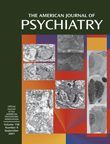Anxiolytic Activity of Atrial Natriuretic Peptide in Patients With Panic Disorder
Abstract
OBJECTIVE: Preclinical evidence exists for the anxiolytic activity of atrial natriuretic peptide, which is released during lactate-induced panic attacks. Atrial natriuretic peptide receptor modulation may have antipanic activity in patients with panic disorder. METHOD: The effects of 150 μg of atrial natriuretic peptide and placebo on panic attacks induced by cholecystokinin tetrapeptide (CCK-4) (25 μg) were studied in 10 panic disorder patients. The panicogenic activity of CCK-4 was measured with the Acute Panic Inventory. RESULTS: Panic attacks occurred in seven patients in the placebo condition and in two patients in the atrial natriuretic peptide condition. CCK-4 administration was accompanied by a significant increase in Acute Panic Inventory scores. Pretreatment with atrial natriuretic peptide resulted in significantly lower Acute Panic Inventory scores than pretreatment with placebo. CONCLUSIONS: The results support the antipanic activity of atrial natriuretic peptide. Nonpeptidergic atrial natriuretic peptide receptor ligands may be ultimately used to treat anxiety disorders.



